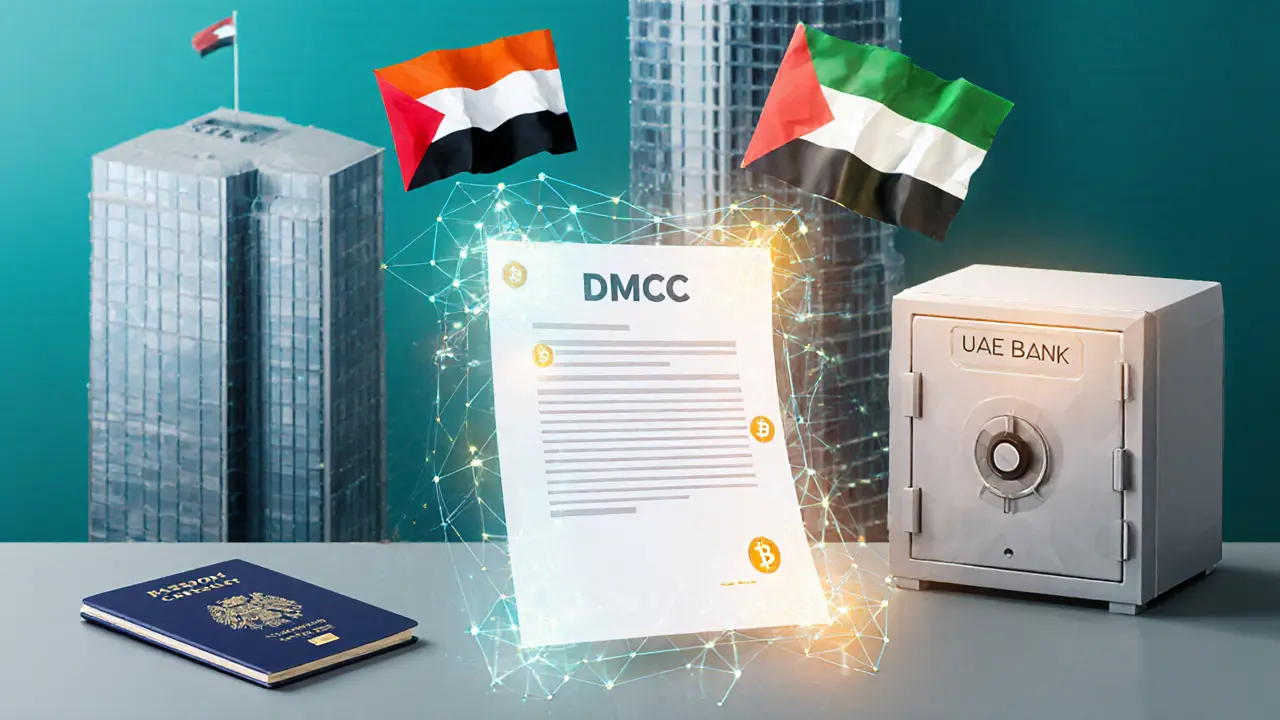Why Indian Crypto Traders Are Moving to Dubai for Tax Savings
 Jan, 14 2025
Jan, 14 2025
Crypto Tax Savings Calculator
Estimate Your Tax Savings
Compare your tax liability in India versus Dubai based on your annual crypto profits.
Tax Comparison Results
| Aspect | India | Dubai |
|---|---|---|
| Tax Rate | 30% + 1% TDS | 0% (Personal Income Tax) |
| Corporate Tax (if applicable) | 25% (plus surcharge) | 9% if revenue > AED 375,000 |
| Deductions | None | Not applicable |
| Estimated Tax Paid | $0 | $0 |
| Net Profit After Tax | $0 | $0 |
| Potential Savings | $0 | |
Imagine pocketing the full $200,000 you earned from crypto trading instead of watching a 30% tax bill eat a third of it. That’s the reality many Indian crypto traders are chasing by moving to Dubai.
TL;DR
- India taxes crypto profits at a flat 30% plus 1% TDS, with no deductions.
- Dubai imposes zero personal income or capital‑gains tax on crypto.
- A $100,000 profit costs $30,000 in India but $0 in Dubai.
- Relocation usually involves a free‑zone company (e.g., DMCC) and a residence visa.
- Stay aware of UAE reporting rules (CARF) and keep thorough records.
What’s driving the migration?
After India’s 2022 crypto‑tax law hit hard, traders started scouting jurisdictions where the tax bite is minimal. Dubai’s 0% personal crypto tax and its growing blockchain ecosystem make it an obvious magnet.
India is a South Asian country that, since 2022, levies a flat 30% tax on all cryptocurrency gains and a 1% Tax Deducted at Source (TDS) on sales over INR50,000. The regime offers no loss offsets and treats short‑ and long‑term gains the same, turning crypto into a high‑cost hobby for many.
By contrast, Dubai is a United Arab Emirates city whose personal tax code excludes cryptocurrency from income, capital‑gains, and wealth taxes. The emirate’s welcoming stance toward digital assets has turned it into a regional crypto hub.
Tax numbers side by side
| Aspect | India | Dubai (UAE) |
|---|---|---|
| Income tax on crypto profits | 30% flat | 0% (no personal income tax) |
| Capital‑gains tax | Integrated in 30% rate | 0% |
| TDS on sales > INR50,000 | 1% (recoverable only after filing) | Not applicable |
| Deduction for trading fees | None | Not needed (no tax) |
| Corporate tax on a personal‑trading entity | 25% (plus surcharge) | 9% if revenue > AED375,000; 0% below |
Real‑world savings examples
Take a trader who makes $150,000 a year:
- In India: 30% tax = $45,000 plus 1% TDS on each sale, roughly another $1,500 in cash flow hit.
- In Dubai: Zero personal tax. Even after the 9% corporate tax (if a company is used and revenue crosses the AED375,000 threshold), the bill is only $13,500.
The net difference is over $30,000 - money that could be reinvested, saved, or used to grow a crypto business.

How to set up shop in Dubai
The most common route is to register a free‑zone company, get a residency visa, and run all trades through that entity. Here’s a quick roadmap:
- Choose a free‑zone that welcomes crypto activities. Dubai Multi Commodities Centre (DMCC) offers a dedicated Crypto‑Asset License and 100% foreign ownership. Other options include International Free Zone Authority (IFZA) which also provides low‑cost licensing for crypto traders.
- Complete the company registration (usually 1‑2weeks). You’ll need a passport copy, proof of address, and a business plan outlining crypto trading activities.
- Apply for a UAE residence visa linked to the company. The visa is typically valid for 2‑3years and can be renewed.
- Open a UAE corporate bank account. Banks that support crypto‑related business include Emirates NBD, Dubai Islamic Bank, and specialized crypto‑friendly institutions.
- Route every trade through the company’s bank account and keep detailed records for VARA compliance.
Regulatory landscape you need to respect
Virtual Assets Regulatory Authority (VARA) is the UAE body that issues licenses, sets AML/KYC standards, and monitors crypto service providers. Getting a VARA‑approved license removes most legal uncertainty and lets you operate openly.
Starting September2025, the UAE will roll out the Crypto‑Asset Reporting Framework (CARF). CARF requires exchanges, custodians, and licensed crypto firms to report transaction data to the tax authority. The framework is about transparency, not taxation, but it means you’ll need to keep accurate transaction logs and be ready for possible data requests.
Checklist before you commit
- Calculate your after‑tax profit in India vs. Dubai. Use the example table above to model different profit levels.
- Assess your trading volume. If annual revenue stays below AED375,000 you avoid the 9% corporate tax.
- Find a qualified legal and tax advisor. International crypto tax is complex; a professional can prevent costly mistakes.
- Plan the visa timeline. Residency visas depend on company registration; start early to avoid gaps.
- Set up proper bookkeeping. VARA and future CARF rules require detailed, auditable records.
- Consider lifestyle factors. Dubai offers a high standard of living, but cost of housing and schooling can be high.
Potential pitfalls and how to dodge them
Even with zero personal tax, relocating isn’t risk‑free.
- Indian tax residency. India determines residency based on the number of days you stay in the country (183‑day rule). Staying longer than 182 days can keep you under Indian tax jurisdiction.
- Double taxation treaties. The UAE‑India treaty does not currently cover crypto, so you must rely on residency rules, not treaty relief.
- Banking hurdles. Some banks remain cautious about crypto clients. Choose a bank known for supporting crypto businesses.
- Regulatory changes. While Dubai’s tax policy is stable, future amendments to CARF or corporate tax thresholds could affect profitability.
Next steps for the serious mover
- Run a detailed profit‑tax simulation (use a spreadsheet).
- Contact a UAE‑based corporate service provider that specializes in crypto licensing.
- Schedule a consultation with an Indian tax adviser to confirm your exit‑clearance plan.
- Begin the free‑zone application process while arranging temporary accommodation in Dubai.
- Once the company and visa are approved, migrate your trading accounts to the new UAE bank account.
- Maintain a dual‑record system - one for UAE compliance, one for any lingering Indian obligations.

Frequently Asked Questions
Do I have to pay any tax in the UAE if I trade crypto?
No. Individuals face zero personal income, capital‑gains, or wealth tax on crypto profits. Only a corporate tax of 9% applies if you operate through a company that earns more than AED375,000 annually.
Can I keep my Indian bank account after moving?
You can, but you’ll need to report any Indian‑sourced income to the Indian tax authorities. Maintaining the account is fine as long as you respect the residency rule and avoid dual tax exposure.
How long does the free‑zone company registration take?
Typically 7‑14days if you have all documents ready. Premium service providers can fast‑track it within 3‑5days for an extra fee.
What is CARF and will it change the tax situation?
CARF (Crypto‑Asset Reporting Framework) is a reporting requirement, not a tax. It forces crypto service providers to share transaction data with UAE authorities. It doesn’t introduce a new tax, but you must keep clean records.
Is the 183‑day rule the only factor for Indian tax residency?
The 183‑day rule is the primary test, but India also looks at factors like a permanent home, economic ties, and intent. If you keep a home or family in India, you could still be deemed a resident.


Lisa Stark
January 14, 2025 AT 08:25When you weigh the allure of zero personal tax against the cultural shift, the decision becomes more than a spreadsheet exercise. Dubai’s free‑zone ecosystem offers a streamlined path for crypto‑focused SMEs, but the price you pay in lifestyle adjustments can be steep. Many Indian traders overlook the residency rule; spending more than 182 days in India keeps you tethered to the old tax net. Meanwhile, the UAE’s strategic location bridges East and West, which can open new partnership avenues. In the end, it’s a balance between fiscal freedom and personal comfort.
Logan Cates
January 18, 2025 AT 23:31Everything they hype about Dubai is just a clever PR stunt.
Joel Poncz
January 23, 2025 AT 14:38i feel ya, the tax side is super tempting but moving to a new place can be crazy stressful. make sure you got all the docs sorted, otherwise you might end up in a legal mess. also, dont forget the 183‑day rule, it's easy to slip up if you travel back often. good luck!
Kris Roberts
January 28, 2025 AT 05:45The notion of “escaping” tax feels like a modern pilgrimage, a quest for a place where your digital earnings can breathe. In many ways, Dubai is positioned as a sanctuary, but sanctuaries still have rules; they just look different. A trader who migrates must also migrate his mindset, embracing regulatory transparency that VARA expects. The corporate tax threshold at AED 375k is a sweet spot – stay under it and you essentially keep the zero‑tax dream alive. Yet, the cost of living, visa renewal, and banking constraints act as invisible taxes on your peace of mind. Reflect on what you value more: the raw numbers or the quality of daily life. The answer will shape how you structure your entity and personal affairs.
lalit g
February 1, 2025 AT 20:51The practical steps outlined for company registration are solid, but many overlook the importance of a local sponsor in certain free zones. Also, keep in mind that the UAE’s anti‑money‑laundering framework is tightening, which means rigorous KYC from day one. Aligning your crypto ledger with VARA’s reporting standards early can save headaches later. Overall, the move makes sense if you’re prepared for the administrative side.
Reid Priddy
February 6, 2025 AT 11:58Sure, you think the admin is “tightening,” but the real danger is the hidden clauses in those free‑zone contracts that let the government back‑track taxes whenever they feel like it. They’ll probably add a crypto levy next year and you’ll be stuck paying without any warning. Stay skeptical.
Shamalama Dee
February 11, 2025 AT 03:05For anyone considering this transition, I recommend drafting a comprehensive migration checklist that includes not only the legal steps but also personal considerations such as health insurance, schooling for children, and cultural adaptation. Engaging a reputable corporate service provider can streamline the licensing process, and consulting a cross‑border tax specialist will ensure you don’t unintentionally trigger Indian tax residency. Maintaining clear documentation for both Indian and UAE authorities will simplify future audits. Remember, success lies in meticulous planning.
scott bell
February 15, 2025 AT 18:11Imagine the neon lights of Dubai flashing over your trading screens and the weight of Indian tax codes disappearing like a bad dream the reality is that you have to set up a proper corporate structure and keep every transaction logged for VARA compliance the freedom feels intoxicating yet the bureaucracy can be a nightmare if you ignore the residency thresholds the corporate tax at 9% only kicks in after a certain revenue level so many traders stay below that line the lifestyle upgrade is real but so is the cost of housing and schooling for expatriate families the decision is yours
Christine Wray
February 20, 2025 AT 09:18While the picture you paint is vivid, it’s worth noting that the cost of living in Dubai can quickly erode the tax savings, especially if you factor in rent, schooling, and healthcare. A thorough cost‑benefit analysis that includes these variables often yields a more realistic view of net gain.
roshan nair
February 25, 2025 AT 00:25Before embarking on the relocation, it is advisable to conduct a detailed profit‑tax simulation using a spreadsheet that captures both Indian and UAE tax parameters.
Include in the model the 30 % personal income tax in India, the 1 % TDS on each crypto sale, and the potential 9 % corporate tax in Dubai should your free‑zone entity exceed the AED 375,000 revenue threshold.
Factor in the cost of establishing a free‑zone company, which typically ranges from USD 3,000 to USD 5,000 for registration and licensing fees.
Add the annual visa renewal expense, often around USD 1,200, and the mandatory health insurance premium, which can be approximately USD 800 per year.
Do not forget the recurring banking charges for maintaining a corporate account, which may include account opening fees of USD 500 and transaction fees on high‑volume trades.
Simultaneously, calculate the expected living expenses in Dubai, including rent for a modest one‑bedroom apartment in a non‑central district, which is roughly USD 1,500 per month.
Utility bills, internet, and transportation typically add another USD 300 to USD 400 monthly, while schooling for children, if applicable, can range from USD 10,000 to USD 15,000 annually.
When these figures are aggregated, the net annual cost of living may approach USD 30,000 to USD 35,000, a substantial amount that must be subtracted from the tax savings.
In parallel, ensure that all crypto transactions are recorded in a compliant ledger that can generate the detailed reports required by the forthcoming Crypto‑Asset Reporting Framework (CARF).
Engage a qualified UAE‑based legal counsel who specializes in VARA licensing to guarantee that your business activities are fully authorized and that AML/KYC procedures meet the regulator’s expectations.
It is also prudent to retain an Indian tax advisor who can guide you through the exit clearance process, including filing the required return for the year of departure and obtaining a No‑Objection Certificate, if applicable.
The Indian tax authorities may still claim jurisdiction if you exceed the 182‑day physical presence rule, so plan your travel schedule meticulously to stay below that threshold.
Consider the strategic advantage of keeping a modest Indian bank account for any residual domestic income, but ensure that all cross‑border transfers are fully documented to avoid allegations of tax evasion.
Professional services firms in Dubai often offer bundled packages that combine company incorporation, visa processing, and bank account setup, which can reduce administrative overhead and time to market.
Ultimately, a disciplined approach that blends accurate financial modeling, regulatory compliance, and realistic cost assessments will enable you to make an informed decision about whether the tax advantages outweigh the operational and lifestyle considerations of relocating to Dubai.
Jay K
March 1, 2025 AT 15:31Thank you for the comprehensive breakdown; the granular cost analysis you provided will be invaluable for anyone weighing this move. I would also add that maintaining a dual‑currency accounting system can simplify reporting across jurisdictions.
Navneet kaur
March 6, 2025 AT 06:38i think dubai is great but cant forget about indian family ties they are important.
Marketta Hawkins
March 10, 2025 AT 21:45Honestly, if you’re still clinging to “family ties” you’ll never succeed – the tax advantage is clear 😊. Move forward or stay stuck.
Drizzy Drake
March 15, 2025 AT 12:51I’ve seen a handful of Indian traders make the jump to Dubai and come back with stories that sound like a mix of triumph and caution. What really helped them was setting up a solid support network of fellow expatriates who could share tips on everything from finding a good crypto‑friendly bank to dealing with the bureaucracy of VARA. Don’t underestimate the power of community; a regular meetup or an online Telegram group can be a lifeline when you hit a roadblock with licensing. Also, keep your personal finances separate from your trading entity – mixing the two can cause headaches during any future audit, whether in India or the UAE. Make sure you have a reliable accountant who knows both Indian GST and UAE corporate tax, because the cross‑border nuances are trickier than they appear. When you finally land in Dubai, treat the city as a launchpad – use the vibrant tech scene to network with blockchain startups and maybe even collaborate on new projects. The lifestyle upgrade is real: you get world‑class infrastructure, safety, and a tax‑friendly environment, but remember that rent and schooling can eat up a chunk of your profits. If you have kids, start researching schools early; the best international schools have long waiting lists, and securing a spot can take months. Lastly, keep an eye on regulatory updates – CARF is just the beginning, and future changes could affect reporting requirements, so stay proactive. All in all, the move can be a game‑changer if you plan meticulously, stay connected, and remain adaptable to the evolving landscape.